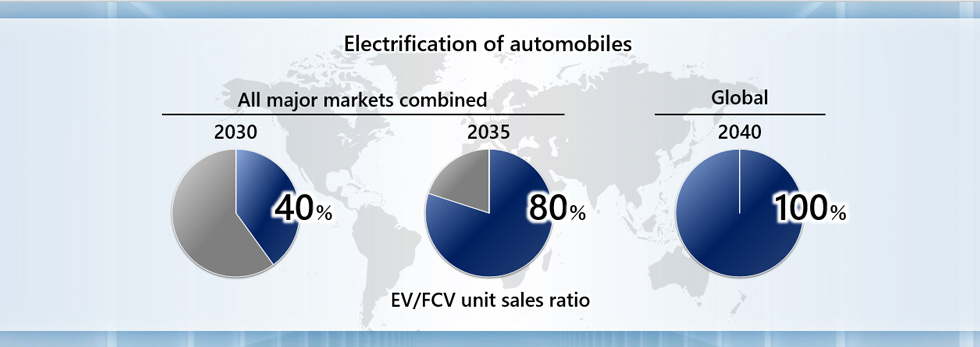Honda’s new CEO announced today that the Japanese automaker aims to achieve 100% “electric” vehicle sales by 2040, but there’s a twist.
They are not giving up on fuel cell hydrogen.
Today, Toshihiro Mibe, Honda’s new CEO, held his inaugural press conference and laid out some new goals for the automaker.
When it comes to electrification, the CEO said:
“In order to achieve our carbon-free goal on a “tank-to-wheel” basis, as the responsibility of an automaker, Honda will strive to increase the ratio of battery-electric vehicles (EVs) and fuel cell electric vehicles (FCVs) within overall unit sales in all major markets of electrification combined to 40% by 2030, to 80% by 2035, and then to 100% globally by 2040. These are challenging targets, and to attain them, we must put forth a collective effort of our entire value chain. However, we decided to set high goals so that all of us share the vision of what we are trying to accomplish and take on challenges toward the realization of our goals.”
Here, Honda breaks down the plans for each market:
North America
- In North America, we will strive for an EV/FCV unit sales ratio of 40% by 2030, 80% by 2035 and 100% by 2040. Leveraging the alliance with GM as one of our strategic pillars, we will pursue electrification in North America efficiently while taking advantage of the respective strengths of both companies
- Honda and GM are jointly developing two large-sized EV models using GM’s Ultium batteries, and we are planning to introduce these models to the North American market as model year 2024 vehicles, one from Honda brand and the other from the Acura brand.
- Starting from the second half of the 2020s, Honda will launch a series of new EV models which adopt e:Architecture, a completely new EV platform led by Honda. These EV models will first be introduced to the North American market, and then to other regions of the world.
China
- In China, we will strive for an EV/FCV unit sales ratio of 40% by 2030, 80% by 2035 and 100% by 2040.
- In China, we have been introducing EV models while utilizing local resources, and we will further accelerate this approach from here forward. We will introduce 10 Honda-brand EV models within five years. As the first of the 10 models, the mass-production model based on the Honda SUV e:prototype is scheduled to go on sale in spring 2022.
- We will further pursue the utilization of local resources, which includes strengthening our collaboration with CATL for the supply of batteries, which are core components for electrified vehicles.
Japan
- In Japan, we will strive for an EV/FCV unit sales ratio of 20% by 2030, 80% by 2035 and 100% by 2040. Also, including hybrid-electric vehicles, we will strive to electrify 100% of our automobile unit sales in Japan by 2030.
- Including the first introduction of an EV model in the K-car segment in 2024, we will continue making progress in the electrification of our mini-vehicles with both hybrid and EV models.
- For the procurement of batteries, we will strive to realize a “local production and local procurement” approach in Japan, which also will contribute to the growth of domestic industries in Japan.
- In the area of mobility services (MaaS), we are aiming to introduce the Cruise Origin, an electric self-driving vehicle Honda is currently developing jointly with GM and Cruise, in the Japanese MaaS market in the mid-2020s. With this aim, we will be starting development for testing in Japan from this year.

Electrek’s Take
Honda is following several automakers announcing move to go all-electric, like GM, BMW’s Mini, and others.
But the Japanese automaker is not talking only about battery-electric vehicles.
Honda, like fellow Japanese automaker Toyota, has long been betting on fuel cell hydrogen as the next alternative to the internal combustion engine.
Technically, fuel cell hydrogen vehicles are considered electric vehicles since the fuel cells power electric motors.
However, the hydrogen supply chain is highly reliant on the fossil fuel industry.
I think it’s a mistake. At this point, I think it’s clear that hydrogen fuel cell vehicles are not going to be able to compete with battery-electric vehicles in passenger vehicles.
On top of that, it looks like most of Honda’s battery-electric vehicles won’t come until the second half of the decade.
I am glad that Mibe seems a bit more aggressive about electrification than his predecessor, but I think this plan is way too slow, and Honda is going to have a tough time if they are only planning 40% electrified sales by 2030.
FTC: We use income earning auto affiliate links. More.
Subscribe to Electrek on YouTube for exclusive videos and subscribe to the podcast.
The Link LonkApril 23, 2021 at 10:40PM
https://ift.tt/3tPECQL
Honda announces 100% ‘electric’ sales by 2040, but there’s a twist - Electrek.co
https://ift.tt/38hkzRl
Honda

No comments:
Post a Comment